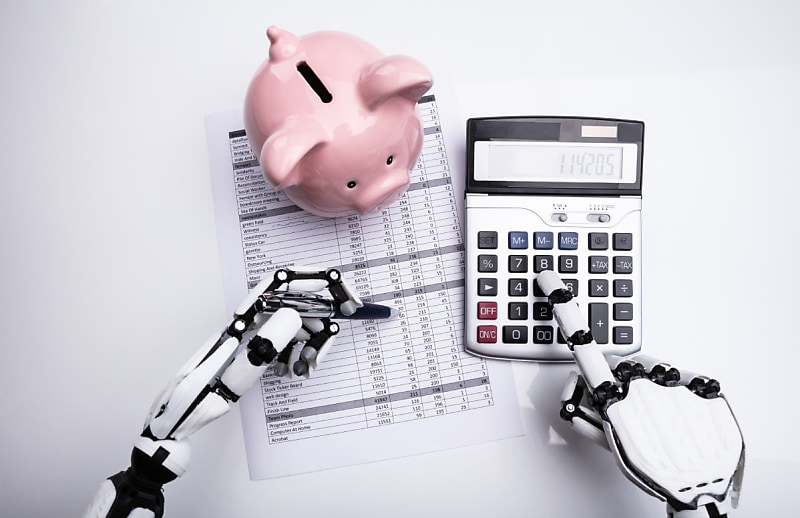Is it time to make way for robo-accountant?
TechnologyIndustry data shows just how far artificial intelligence is taking over.

When it comes to how technology will change accountancy the same questions always come up: will artificial intelligence take over? Will there even be a need for accountants in future?
AI enables machines to mimic humans in the way we solve problems and think. By copying human behaviour, AI can perform lots of essential tasks and process information more quickly and accurately. That’s why AI could have a huge impact on accounting – its processes can be readily mimicked by machine learning.
The AI software industry is one of the fastest growing tech sectors and the world market is thought to be worth $62 billion. In accounting, it’s forecast to expand by about 45 per cent a year and reach $16 billion by 2028.
Is AI really the enemy?
When we talk about robots taking over accountants’ jobs we don’t mean R2-D2 looking over an income statement – at least, not yet. The robots are software and machines that complete tasks in seconds that might take an accountant hours.
Some studies suggest that power means the industry will be rife with dismissals, with forecasts that roughly 800 million jobs could be lost to AI by 2030. One study by Semrush revealed that 38 per cent of employees thought their job would be automated by next year with 13 per cent expecting AI to completely eliminate their position. Accountants across the country have developed a fear that their billable hours will be hit by AI as it could cut time-consuming tasks in half.
The head of IT at the Institute of Chartered Accountants in England and Wales, Richard Anning, said: “If you’re looking at some of the more repetitive bookkeeping or process-driven tasks, those are more likely to be subjected to automation than the higher value tasks. Automation is occurring at the staff level, but it will creep up the corporate ladder and begin to automate higher level accounting jobs.”
Aside from the risk of complete takeover, there are other ways AI might negatively impact how we work. Relying solely on AI leaves systems vulnerable to hacking. Using robots removes the human touch in customer service.
The bigger picture
Step back, and impact of AI on accounting may be less scary than you think. Businesses will always need accountants because someone needs to analyse and interpret the data, as well as consult with clients.
A study by Sage found that 22 per cent of accounting firms thought AI improves business operations and helps automate tasks, while a further 50 per cent plan to use automation. Another 35 per cent said better accounting technology helps keep pace with client demands.
With AI able to complete payroll, audit and tax preparation it is inevitable more agencies will adopt it. That will present opportunities for accountants to add new roles and services to their business. Semrush said AI can reduce operating times and human error, enable greater business insight, enhance productivity and by automating rote tasks, leave more room for customer service.
The chief executive of FloQast (accounting software) Michael Whitmire believes that if small firms fail to adapt there is a danger of being left behind. A survey by UK software company FreeAgent found accountants believe AI could save as much as 10 working hours a week and potentially unlock up to $119,000 of additional revenue. Similarly, the ATO estimates up to $28 billion can be saved within the next 10 years by using AI for e-invoicing systems while Vanguard Systems believes that, on average, accounts payable automation will pay for itself within six to 18 months.
Sage’s Practice of Now Report found 66 per cent of accountants plan to invest in AI and 55 per cent expect to use it within three years. Accenture’s New Face of Wealth Management showed 68 per cent of wealthy clients prefer a combination of human and robo-adviser, rather than just one or the other.
Although some roles will be replaced, incorporating AI into accounting will create opportunities and encourage people to apply machine learning to finance. With these new and improved roles, some studies said salaries will increase by 20 per cent thanks to a shortage of expertise in this area.
What does the future of accounting look like?
Plenty of fear surrounds the potential of AI in accounting but the bigger picture showed this technology is an opportunity to improve functions and processes. Instead of AI or human intelligence working independently, they will integrate to increase quality, improve efficiency and provide superior data analysis. While some roles could be replaced, many jobs that accountants will be doing in the next 20 years have not been invented yet. Instead of viewing this change as a war between robots and humans, the future will be an ideal blend of AI and human intelligence working side by side, changing the way accountants audit, analyse data and financial statements.
AI will replace some processes and accounting functions, but it will also create advanced jobs that require new skills and experience, unlock flexibility and – potentially – additional revenue.
We should no longer be scared of technology but celebrating how far we have come.
Brett Willmot is principal of Willmot Accounting.



